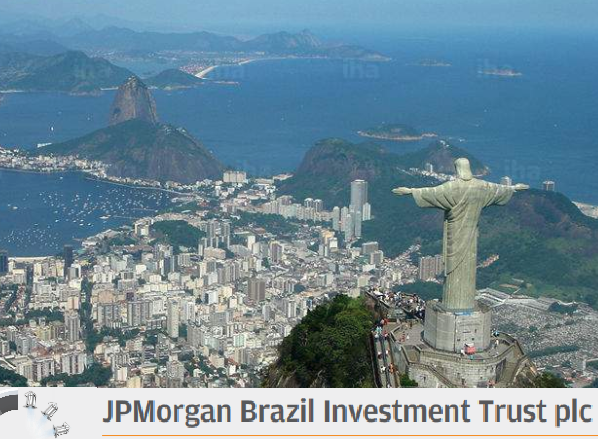JPMorgan Brazil struggles in a politically-driven market – During JPMorgan Brazil (JPB)’s financial year to 30th April 2018, Brazil’s equity market experienced a highly volatile period mainly driven by political concerns.
Performance
- The company recorded more modest sterling returns this year as the Brazilian currency, the Real significantly weakened against Sterling by some 17%.
- The total return on net assets was +4.1%, compared with +11.1% returned by the benchmark, the MSCI Brazil 10/40 Index.
- The share price return to shareholders was +4.3%
- The discount to NAV remained steady at 14.0%, both at the start and at the end of the financial year.
Market review
Brazilian equities have been volatile in the twelve months to 30th April 2018, with the MSCI Brazil 10/40 Index return of 11.1%.
Allegations of corruption against President Michel Temer early in the reporting period eroded investor confidence from May onwards, sparking a significant correction in the country’s equity market. While the Lower House later rejected the charges levelled against Temer, the political scandal has undermined his support in Congress, leaving him in a substantially weaker position. However, the market subsequently recovered some of its previous strength as macro data, including inflation rates and industrial and consumer confidence, improved on the back of the tangible progress being made with the reform agenda. In addition, the period saw improving government finances and improvements in companies’ earnings.
The end of 2017 saw uncertainty amongst investors as to the direction of much needed pension reform, notwithstanding earlier progress. This led to a decline in the market, despite a further interest rate cut by the Brazilian Central Bank in December, down to a record low of 7%. Moving into 2018, the market rallied sharply in January, driven higher by the hopes of a faster than expected economic recovery, the expectation that ex-President Lula’s conviction would be upheld, reducing the likelihood of him participating in the October 2018 Presidential elections, and a further reduction in interest rates by the Central Bank to 6.5%.
Following the end of the reporting period, a much publicised strike by truck drivers in May 2018, accompanied by road blocks, led to shortages of supplies and froze production in all areas of the economy. This event cost Brazil in the region of 0.8% of GDP for the full year and contributed to the already revised lower GDP forecasts. There may also be some knock-on effects with a negative impact anticipated on business and consumer confidence.
Portfolio review
Against this backdrop, while stock selection contributed positively to performance, sector allocation detracted, primarily in commodities, and the company’s overweight exposure to the consumer discretionary sector detracted from relative performance against the MSCI Brazil 10/40 Index. The portfolio’s underweight exposure to Vale, an iron ore company, was a detractor from performance. The stock performed well as commodities, and more specifically iron ore prices, rebounded from their summer lows.
Outlook from Investment Managers Luis Carrillo and Sophie Bosch De Hood
“Although disappointing recent macro trends have been of some concern, we continue to believe that the primary drivers of the market this year will be the gradual recovery of the Brazilian economy, with increased levels of consumer consumption and corporate investment, as well as the presidential elections. In these circumstance, market volatility may offer opportunities to add to quality names at attractive valuations. Expectations for a strong reform program seem to be low at the current time; however, we believe the next administration will be forced by circumstances, at a minimum, to enact social security and tax reform in 2019. Rising commodity prices have been supportive of commodity exporting markets and companies, and we continue to monitor our exposure to these sectors from a risk perspective.
Finally, our portfolio includes long-standing investments in high-quality companies, as well as cyclical stocks positioned for strength in the commodities sector and a recovery in the local economy.”
JPB : JPMorgan Brazil struggles in a politically-driven market
